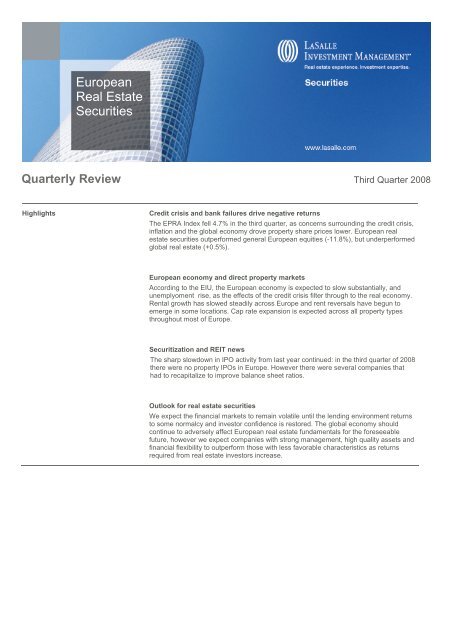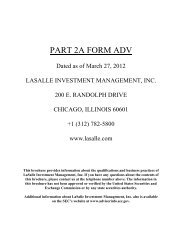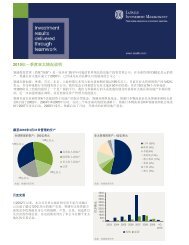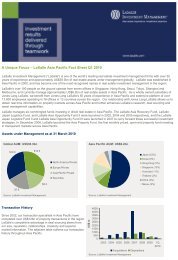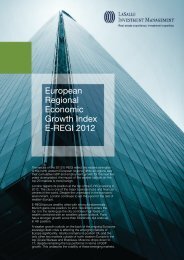Quarterly Review - LaSalle Investment Management
Quarterly Review - LaSalle Investment Management
Quarterly Review - LaSalle Investment Management
Create successful ePaper yourself
Turn your PDF publications into a flip-book with our unique Google optimized e-Paper software.
European<br />
Real Estate<br />
Securities<br />
<strong>Quarterly</strong> <strong>Review</strong> Third Quarter 2008<br />
Highlights<br />
Credit crisis and bank failures drive negative returns<br />
The EPRA Index fell 4.7% in the third quarter, as concerns surrounding the credit crisis,<br />
inflation and the global economy drove property share prices lower. European real<br />
estate securities outperformed general European equities (-11.8%), but underperformed<br />
global real estate (+0.5%).<br />
European economy and direct property markets<br />
According to the EIU, the European economy is expected to slow substantially, and<br />
unemplyoment rise, as the effects of the credit crisis filter through to the real economy.<br />
Rental growth has slowed steadily across Europe and rent reversals have begun to<br />
emerge in some locations. Cap rate expansion is expected across all property types<br />
throughout most of Europe.<br />
Securitization and REIT news<br />
The sharp slowdown in IPO activity from last year continued: in the third quarter of 2008<br />
there were no property IPOs in Europe. However there were several companies that<br />
had to recapitalize to improve balance sheet ratios.<br />
Outlook for real estate securities<br />
We expect the financial markets to remain volatile until the lending environment returns<br />
to some normalcy and investor confidence is restored. The global economy should<br />
continue to adversely affect European real estate fundamentals for the foreseeable<br />
future, however we expect companies with strong management, high quality assets and<br />
financial flexibility to outperform those with less favorable characteristics as returns<br />
required from real estate investors increase.
European Real Estate Securities<br />
<strong>Quarterly</strong> <strong>Review</strong> Third Quarter 2008<br />
Third Quarter 2008 <strong>Review</strong><br />
European property companies saw a negative return in the third quarter of 2008. The<br />
EPRA Europe Index lost 4.7%, thereby underperforming bonds (+3.9%) and utilities<br />
(+1.8%), but outperforming European equities. Europe underperformed the global<br />
property universe (+0.5%).<br />
Europe<br />
EPRA Index (in €) (%) UBS Investors Index (in local) (%)<br />
Cont.<br />
Europe UK Globe Europe<br />
Cont.<br />
Europe UK Globe<br />
JP Morgan<br />
Bond<br />
Index<br />
EMU<br />
(€) (%)<br />
MSCI<br />
European<br />
Equity<br />
Index<br />
(%)<br />
FTSE<br />
E300<br />
Utilities<br />
Index<br />
(€) (%)<br />
Q3 2008 -4.7 -10.4 5.2 0.5 -7.3 -13.2 3.5 -1.5 3.9 -11.8 1.8<br />
YTD 2008 -21.9 -20.7 -23.6 -19.5 -21.4 -22.7 -19.1 -13.3 3.2 -28.4 -8.2<br />
3-year Ann -6.6 -4.4 -9.7 -2.7 -5.6 -5.1 -6.0 0.9 1.4 -3.7 11.0<br />
5-year Ann 9.6 12.0 6.5 8.6 8.9 10.8 8.4 11.1 3.4 4.9 16.4<br />
Standard<br />
Deviation<br />
4.4 4.3 5.2 4.4 4.4 4.4 5.1 4.1 1.0 3.6 3.0<br />
Source: Bloomberg, FTSE EPRA/NAREIT. Standard deviations are monthly, from June 2003<br />
Within Europe, the UK (+5.2%) outperformed the Continent (-10.4%) in Euro terms. This<br />
outperformance was of the same magnitude on a local currency basis. Of the major<br />
countries, low beta countries Belgium (+6.3%) and Switzerland (+4.8%) outperformed.<br />
The higher geared companies of Finland (-21.3%) and Austria (-53.1%) raised<br />
questions from investors about their financial stability and therefore underperformed.<br />
Both in the UK and in the Continent, retail was the best performing sector. (see<br />
following page for country and sector performance).<br />
Although the difficult economic times were not difficult enough to offset the increased<br />
inflation concerns, it led to weak REIT and general equities returns in the quarter.<br />
Companies with higher leverage—and especially those with short-term refinancing<br />
needs—were the worst performing companies this quarter. Economic news dominated<br />
the headlines; weaker macro-economic data, expected growth of GDP corrected to the<br />
downside, drying up of liquidity at the banks as well as the bankruptcy of Lehman and<br />
AIG and alike problems at Merrill Lynch, Morgan Stanley and other big banks also<br />
negatively impacted the equity markets along with the real estate companies.<br />
ImmoFinanz and Immoeast were the top underperformers in the Continent following<br />
their negative earnings announcements and disclosure about an inter-company loan.<br />
Since September 18, when Immoeast reported earnings, ImmoFinanz and Immoeast’s<br />
share dropped 43.2% and 41.8%, respectively, as investors question both companies’<br />
financial status. IVG (IVG GY) was negatively impacted by the sale of its cavern<br />
business for a lower than expected price of € 1.73 billion.<br />
In the UK, Minerva (MNR LN) was the worst performing company after Limitless<br />
confirmed it would not proceed with its proposed acquisition of Minerva following its due<br />
diligence process. Hammerson (HMSO LN) announced that the Ontario Teachers<br />
Pension Plan owns a 10% stake in the company, while rumors about the Simon<br />
Property (SPG US) and Westfield’s (WDC AU) stake in Liberty International (LII LN)<br />
caused speculation about potential takeouts in the sector.
European Real Estate Securities<br />
<strong>Quarterly</strong> <strong>Review</strong> Third Quarter 2008<br />
European Real Estate Securities:<br />
EPRA Index performance and<br />
exposure<br />
Country/Sector<br />
(total returns<br />
in local currencies)<br />
3Q08<br />
(%)<br />
2008<br />
(%)<br />
3-Yr<br />
Annlzd<br />
(%)<br />
Country/Sector<br />
(total returns<br />
in local currencies)<br />
3Q08<br />
(%)<br />
2008<br />
(%)<br />
3-Yr<br />
Annlzd<br />
(%)<br />
Austria -53.1 -57.1 -28.6 Eurozone (in €) -10.8 -20.6 -4.7<br />
Belgium 6.3 -0.7 2.6 All Europe (in €) -4.7 -21.9 -6.6<br />
Denmark<br />
-54.8 -61.4 -25.3<br />
All Europe –<br />
Investors<br />
-7.3 -21.4 -5.6<br />
Finland<br />
-21.3 -33.5 -7.8<br />
Cont Eur –<br />
Diversified<br />
-15.9 -27.6 -4.5<br />
France -4.3 -9.7 4.6 Cont Eur – Office -14.0 -26.2 -8.6<br />
Germany<br />
-13.0 -40.8 -17.6<br />
Cont Eur –<br />
Residential<br />
-18.6 -40.0 -24.8<br />
Greece -10.5 -18.4 9.0 Cont Eur – Retail -6.9 -13.2 3.7<br />
Italy -7.4 -43.2 -22.2 UK – Diversified 2.9 -20.8 -6.2<br />
Netherlands -1.9 -10.8 2.5 UK – Industrial 2.6 -14.0 -6.0<br />
Sweden -3.4 -23.0 -3.4 UK – Office -4.0 -30.2 -10.7<br />
Switzerland 4.8 12.6 4.2 UK – Residential -4.7 -38.5 -16.5<br />
United Kingdom 4.7 -18.0 -5.2 UK – Retail 7.8 -11.5 -0.8<br />
Source: FTSE EPRA/NAREIT, UBS, and <strong>LaSalle</strong> <strong>Investment</strong> <strong>Management</strong><br />
EPRA Europe Real Estate Index –<br />
Company Geographic Exposure<br />
UK (36.3%)<br />
Turkey (0.6%)<br />
Switzerland (4.1%)<br />
Sweden (6.8%)<br />
Spain (2.5%)<br />
Portugal (0%)<br />
Norway (0.5%)<br />
Netherlands (4.1%)<br />
Italy (3.2%)<br />
Greece (0.9%)<br />
Germany (4.5%)<br />
France (21.6%)<br />
Finland (1.7%)<br />
Denmark (0.4%)<br />
Belgium (3.9%)<br />
Austria (2.2%)<br />
CEE (4.9%)<br />
Other Country (1.2%)<br />
United States (0.4%)<br />
Data as at 30 September 2008 by geographic exposure; Source: FTSE EPRA/NAREIT and <strong>LaSalle</strong> <strong>Investment</strong> <strong>Management</strong><br />
EPRA Europe Real Estate Index –<br />
Country Weights by Listing<br />
Austria (6.1%)<br />
Belgium (3.3%)<br />
CEE (1.2%)<br />
Denmark (0.3%)<br />
Finland (1.4%)<br />
France (24.9%)<br />
Germany (2.9%)<br />
Greece (0.9%)<br />
Italy (1.3%)<br />
Netherlands (10.0%)<br />
Norway (0.5%)<br />
Spain (0.1%)<br />
Sweden (4.9%)<br />
Switzerland (4.1%)<br />
Britain (38,1%)<br />
Data as at 30 September 2008 by listing; Source: FTSE EPRA/NAREIT and <strong>LaSalle</strong> <strong>Investment</strong> <strong>Management</strong>
European Real Estate Securities<br />
<strong>Quarterly</strong> <strong>Review</strong> Third Quarter 2008<br />
EPRA Europe Real Estate Index –<br />
Company Sector Exposure<br />
Other<br />
0,6%<br />
Office<br />
18,7%<br />
Diversified<br />
36,1%<br />
Industrial<br />
4,7%<br />
Residential<br />
2,7%<br />
Retail<br />
37,2%<br />
Data as at 30 September 2008 by company property exposure; Source: FTSE EPRA/NAREIT and <strong>LaSalle</strong> <strong>Investment</strong> <strong>Management</strong><br />
Best performers in the quarter<br />
Worst performers in the quarter<br />
During the third quarter the companies with low leverage or otherwise companies that were<br />
able to secure refinancings and removed near term financial risks were the winners of the<br />
quarter. Development Securities was the strongest performer in the month rebounding off its<br />
52-week low in July, solid earnings in late August and a sell-side upgrade.<br />
The worst performers of the quarter were the companies with higher degrees of uncertainty<br />
concerning their respective futures. Plaza Centers was punished for its involvement in<br />
(higher risk) Eastern-European developments, while the uncertainty surrounding the<br />
financial condition of both Norwegian Property and ImmoFinanz resulted in large<br />
underperformance. Minerva was negatively impacted by the withdrawal of a bid from<br />
Limitless (a real estate development subsidiary of Dubai World).<br />
Top- and bottom-performing<br />
companies: EPRA Europe Index<br />
Company Name Country Q3 2008 (%) YTD 2008 (%)<br />
Development Securities UK 34.3 -20.3<br />
Invista Foundation Property UK 34.1 -35.8<br />
Daejan Holdings UK 22.3 -6.9<br />
Intervest Offices Belgium 13.7 -2.5<br />
Big Yellow Group UK 13.2 -24.4<br />
Plaza Centers UK -54.5 -59.9<br />
TK Development Denmark -54.8 -61.4<br />
Norwegian Property Norway -57.8 -81.2<br />
Minerva UK -60.7 -74.4<br />
ImmoFinanz Austria -62.8 -64.9<br />
Source: FTSE EPRA/NAREIT and Bloomberg
European Real Estate Securities<br />
<strong>Quarterly</strong> <strong>Review</strong> Third Quarter 2008<br />
European economy<br />
Economic overview<br />
Forecasts<br />
Euro Area<br />
UK<br />
Sweden<br />
Source: EIU<br />
Current (Sep 08) (%)<br />
QoQ Change (%)<br />
(Jun 08 – Sep 08)<br />
2008 2009 2010 2008 2009 2010<br />
GDP 1.2 1.1 1.9 -0.4 -0.7 -0.2<br />
CPI 3.5 2.5 1.9 +0.6 +0.3 -<br />
Unemployment 7.3 7.6 7.3 +0.3 +0.8 +0.6<br />
GDP 1.0 -0.3 1.1 -0.7 -1.7 -1.0<br />
CPI 3.8 2.2 1.8 +0.4 -0.3 -0.3<br />
Unemployment 5.5 6.3 6.7 +0.3 +0.9 +0.9<br />
GDP 1.0 0.6 2.2 -0.9 -1.3 -0.7<br />
CPI 3.6 2.4 2.1 +0.1 - -<br />
Unemployment 6.1 7.1 7.1 - +0.9 +1.0<br />
Rising interest rates, reduced availability of capital, the strong Euro, declining business<br />
confidence and a gloomy world economic outlook have dampened economic performance<br />
in the Euro zone region. GDP growth flattened, inflation hit record highs in the third quarter<br />
of 2008 and commodity prices rose to levels never seen before.<br />
In the Euro area, Germany and Spain will likely suffer a technical recession because of the<br />
continued credit market crisis and high commodity prices. The economies of France and<br />
Italy will likely remain stagnate, but are not expected to contract for consecutive quarters<br />
despite their GDP contraction in the second quarter. The European commission expects<br />
Britain to slip into recession in the second half of this year for the similar reasons: the<br />
financial markets crisis, higher inflation plus its collapsing housing market.<br />
Unemployment data showed that German labor market conditions are still improving despite<br />
the slowdown in the wider economy, however survey measures of hiring intentions point to<br />
a reduction in employment growth to come. Market conditions are deteriorating in Europe as<br />
a whole, with unemployment now rising in France, Italy, Spain and the UK.<br />
The headline inflation rates in Europe remain far above the central bank’s price stability<br />
ceiling. Although increasing wage growth prevents core inflation from falling too sharply, the<br />
latest economic figures have brought evidence that price pressure is receding. In<br />
September, the oil price fell substantially and food inflation dropped from its recent highs of<br />
over 6%.<br />
The ECB, BOE and Riksbank all cut target lending rates in line with the coordinated central<br />
bank activity in early October. As price pressures continue to fade, more rate cuts are<br />
foreseeable in Europe.
European Real Estate Securities<br />
<strong>Quarterly</strong> <strong>Review</strong> Third Quarter 2008<br />
European direct property market<br />
As 2008 has progressed and the impact of the credit crisis is now, a year after the first signs<br />
of an evolving crisis, being felt in real estate markets across the region where many of the<br />
markets have turned or are close to turning in favor of the occupier. Competition for space<br />
and the volume of deals completed has been solid but far from spectacular. The rate of<br />
rental growth has tailed-off steadily across the market and rent reversals have begun to<br />
emerge in some locations. The choice of available product also shows signs of increasing<br />
gradually in markets, albeit with the highest quality space remaining in short supply.<br />
Yet these changes in market conditions have occurred at a time when occupier confidence<br />
is falling sharply and the willingness to commit to new real estate has diminished<br />
correspondingly. The wait-and-see attitude has become more widespread and pertinent<br />
across Europe, not just the mature Western European markets. <strong>Investment</strong> activity remains<br />
subdued and there continues to be a divergence between valuations and market pricing.<br />
Key to outperformance over the next 18 to 24 months will be the successful conclusion of<br />
asset management initiatives: keeping space occupied and capturing any residual rental<br />
growth in the occupier markets, whilst ensuring that tenants have robust covenants.<br />
Retail<br />
Office<br />
End 2Q08<br />
vs 1Q08<br />
Prime<br />
Yield<br />
(%)<br />
Prime<br />
Yield<br />
Change<br />
(%)<br />
Prime Rent<br />
Change<br />
QoQ<br />
(%)<br />
Prime<br />
Yield<br />
(%)<br />
Prime<br />
Yield<br />
Change<br />
(%)<br />
Prime Rent<br />
Change<br />
QoQ<br />
(%)<br />
London 5.00 0.00 1.80 London 4.50 0.00 -4.40<br />
Paris 4.50 +0.50 7.70 Barcelona 5.25 +0.50 0.00<br />
Barcelona 5.00 +0.50 0.00 Stockholm 4.65 +0.15 2.30<br />
Madrid 5.00 +0.50 0.00 Madrid 5.25 +0.50 0.60<br />
Stockholm 4.65 +0.15 0.00 Paris 4.75 +0.25 0.00<br />
Frankfurt 4.75 0.00 n/a Amsterdam 5.25 +0.25 0.00<br />
Munich 4.75 +0.25 n/a Brussels 5.75 +0.05 -3.40<br />
Amsterdam 4.25 0.00 0.70 Frankfurt 4.80 +0.30 0.00<br />
Brussels 4.50 0.00 0.00 Munich 4.75 +0.25 1.70<br />
Source: JLL<br />
Securitization and REIT news<br />
The sharp slowdown in IPO activity from the previous quarters continued: in the third<br />
quarter of 2008 there was no property IPO in Europe. However there were several<br />
companies that had to recapitalize to improve balance sheet ratios.<br />
In July Norwegian Property increased its share capital with a rights issue in order to<br />
recapitalize the company. Aedes proposed a € 171 million capital increase, also in order to<br />
solve financial problems. Sopaf has agreed to underwrite the rights issue that is not taken<br />
up by the existing shareholders. The Board of Dawnay Day, Treveria has decided to pursue<br />
a strategy of targeted disposals combined with a possible injection of new equity into the<br />
business after breaching its loan covenants.<br />
Klepierre announced a € 200 - 300 million rights issue, to be performed later in the year, to<br />
finance its € 600 million stake in the Steen & Strom portfolio.<br />
Several companies announced that they would (re-)launch a share buy-back program.<br />
Austrian companies CA Immo and Conwert and Beni Stabili from Italy bought back shares<br />
because the share price was at a deep discount to their NAV.
European Real Estate Securities<br />
<strong>Quarterly</strong> <strong>Review</strong> Third Quarter 2008<br />
Valuation and outlook for real estate<br />
securities<br />
The third quarter marked the beginning of a series of investment and commercial bank<br />
failures that paralyzed the capital markets and created economic panic among investors.<br />
These failures were not limited to a specific region or financial institution and impacted all<br />
securities across the entire public market. European real estate securities were not an<br />
exception. Companies with high leverage, significant refinancings and large development<br />
exposure were hit hardest by the investor uncertainty.<br />
Financial strains globally have pushed several European countries closer to or into technical<br />
recession. Consumer spending throughout Europe has declined as a result of higher<br />
savings and lower housing wealth, while corporate spending has slowed due to the frozen<br />
lending environment and increase in debt cost.<br />
We expect the financial markets to remain volatile until the lending environment returns to<br />
some normalcy and investor confidence is restored. Worldwide rescue of financial<br />
institutions thought too large to fail has already begun in the United States, Europe and<br />
Asia. The United Kingdom, Germany, France, Ireland and Benelux countries have led<br />
Europe in the public sector rescue of financial services firms, however more countries are<br />
expected to follow.<br />
The global economy should continue to adversely affect European real estate fundamentals<br />
for the foreseeable future with further reductions in property values and rental growth rates<br />
expected. We expect greater disparity in performance between companies with strong<br />
management, high quality assets and financial flexibility to those with less favorable<br />
characteristics. This bifurcation between high and low risk companies has already become<br />
apparent with Austria as these companies with high leverage and poor disclosure<br />
performed the worst in Europe this quarter.<br />
Overall, European real estate companies are relatively well positioned to ride out the current<br />
capital market crisis. The current 5.6% dividend yield is well covered and shares are trading<br />
at nearly a 30% discount to NAV. We believe these discounted valuations provide<br />
substantial buffer in the current economic environment.
European Real Estate Securities<br />
<strong>Quarterly</strong> <strong>Review</strong> Third Quarter 2008<br />
About <strong>LaSalle</strong><br />
<strong>LaSalle</strong> <strong>Investment</strong> <strong>Management</strong> Securities is a leading property securities investment<br />
manager for pension funds, institutional and retail investors around the globe. With more<br />
than 20 years of investment experience, the firm currently has $8.9 billion of assets<br />
under management in listed property securities, including US, European and global<br />
mandates. <strong>LaSalle</strong> <strong>Investment</strong> <strong>Management</strong> Securities is <strong>LaSalle</strong> <strong>Investment</strong><br />
<strong>Management</strong>’s specialist securities division and as such benefits from the resources of<br />
both <strong>LaSalle</strong> <strong>Investment</strong> <strong>Management</strong> and Jones Lang <strong>LaSalle</strong>. <strong>LaSalle</strong> <strong>Investment</strong><br />
<strong>Management</strong> is one of the world’s leading property investment managers with more than<br />
$54 billion of public and private property assets under management across Europe,<br />
North America and Asia Pacific. The firm employs 631 professionals (747 staff in total),<br />
including a 27-strong industry-leading strategy and research team.<br />
<strong>LaSalle</strong> <strong>Investment</strong> <strong>Management</strong> is a wholly owned but operationally independent<br />
division of Jones Lang <strong>LaSalle</strong>, a publicly-traded global property services provider.<br />
Comments to<br />
<strong>LaSalle</strong> <strong>Investment</strong> <strong>Management</strong> Securities B.V.<br />
Ernst-Jan de Leeuw Portfolio Manager +31 20 530 8878<br />
ernst-jan.de-leeuw@lasalle.com<br />
Matthew Sgrizzi, CFA Analyst +31 20 530 8883<br />
matthew.sgrizzi@lasalle.com<br />
John Wallace Analyst +31 20 530 8876<br />
john.wallace@lasalle.com<br />
Sarah Blein Analyst +31 20 530 8877<br />
sarah.blein@lasalle.com<br />
Gerben Karkdijk Analyst +31 20 530 8896<br />
gerben.karkdijk@lasalle.com<br />
Panos Zafeiriou Analyst +31 20 530 8894<br />
panos.zafeiriou@lasalle.com<br />
Daniel DeMarco Trader +31 20 530 8872<br />
daniel.demarco@lasalle.com<br />
Michael Jongmans Trader +31 20 530 8897<br />
michael.jongmans@lasalle.com<br />
<strong>LaSalle</strong> <strong>Investment</strong> <strong>Management</strong> Research and Strategy (London)<br />
Robin Goodchild +44 20 7852 4390<br />
robin.goodchild@lasalle.com<br />
Alistair Seaton +44 20 7852 4525<br />
alistair.seaton@lasalle.com<br />
Andrea Pavelka +44 20 7852 4492<br />
andrea.pavelka@lasalle.com<br />
<strong>LaSalle</strong> <strong>Investment</strong> <strong>Management</strong> Securities B.V. | Herengracht 471 | 1017 BS Amsterdam | The Netherlands | Tel +31 20 530 8888 Fax +31 20 530 8890<br />
This publication has been produced by <strong>LaSalle</strong> <strong>Investment</strong> <strong>Management</strong> Securities ("LIMS"), which is regulated by the Dutch Autoriteit Financiële Markten.<br />
This publication is confidential and intended for current clients of LIMS and professional institutional advisors only and is not to be provided to other persons. This publication does not constitute an offer to sell, or the solicitation of an offer to buy,<br />
any securities or any interests in investment funds advised by, or the advisory services, of LIMS. This publication has been prepared without regard to the specific investment objectives, financial situation or particular needs of recipients. No<br />
legal or tax advice is provided. Recipients should independently evaluate specific investments and trading strategies. By accepting receipt of this publication, the recipient agrees not to distribute, offer or sell this publication or copies of it and<br />
agrees not to make use of the publication other than for its own general information purposes.<br />
The views expressed in this publication represent the opinions of the persons responsible for it as at its date, and should not be construed as guarantees of performance with respect to any investment. LIMS has taken reasonable care to<br />
ensure that the information contained in this publication has been obtained from reliable sources but no representation or warranty, express or implied, is provided in relation to the accuracy, completeness or reliability of such information. LIMS<br />
does not undertake and is under no obligation to update or keep current the information or content contained in this publication for future events.<br />
The forecasts contained in this publication are generated from a range of statistical techniques, including econometric models. They are subject to errors stemming from three main sources: measurement and statistical error which relate to raw<br />
data and the econometric model, as well as error arising from assumptions regarding the future behaviour of explanatory variables. As a result, we place greater emphasis on trends and turning points than on precise values. Please note that the<br />
forecasts do not include the impact of any commissions, fees or other charges that may be payable.<br />
Past performance is not necessarily indicative of future results. In addition the price and/or value of and income derived from any particular investment may vary because of changes in interest rates, foreign exchange rates, operational or<br />
financial conditions. Investors may therefore get back less than originally invested. Furthermore, these investments may not be eligible for sale in all jurisdictions or to certain categories of investors.<br />
LIMS does not accept any liability in negligence or otherwise for any loss or damage suffered by any party resulting from reliance on this publication.<br />
© 2008 <strong>LaSalle</strong> <strong>Investment</strong> <strong>Management</strong>. All rights reserved. No part of this publication may be reproduced by any means, whether graphically, electronically, mechanically or otherwise howsoever, including without limitation photocopying<br />
and recording on magnetic tape, or included in any information store and/or retrieval system without prior written permission of <strong>LaSalle</strong> <strong>Investment</strong> <strong>Management</strong>.


